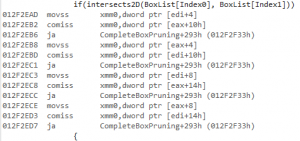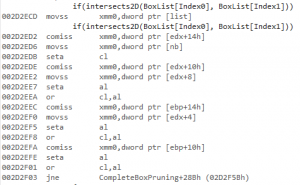Box pruning revisited - part 8 - branchless overlap test
Part 8 – branchless overlap test
For this post, we start again from version 6b, ignoring our experiments with integer comparisons in version 7. We are going to stay focused on comparisons though, and looking at this function:
It contains four comparisons, and four branches. The box values are going to be arbitrary, so these branches are the worst you can get: branch prediction will essentially never work for them. If we check the disassembly, it looks like this:
Pretty much what you’d expect from the C++ code, and all the comparisons and branches are there indeed.
Comparisons and branches. We often talk about these two as if they would always go hand in hand and come together, but they are very different things and it’s important to distinguish between the two. In terms of performance, one of them is more expensive than the other.
Let me demonstrate. We can rewrite the overlap function this way:
Compare to the previous function, and you easily see that the comparisons are still there in the C++ code. We still compare max floats to min floats, four times, none of that has changed. We just wrote the code slightly differently.
Compile it, run it, and… You get exactly the same timings as before. In fact, you get exactly the same disassembly. Thus, the branches are also all there. Well really, that makes sense.
Now, however, for something that perhaps does not make as much sense, remove three characters from this function and write it this way instead:
Pretty much the same, right?
Well, not quite. The compiler begs to differ, and produces the following disassembly:
The comparisons are still here (the “comiss”) but the branches are mostly gone: there’s only one branch instead of four. That’s all thanks to the “seta” instructions, which can store the results of our comparisons directly in a register, in a branchless way. Technically the final branch is not even in the overlap function itself, it’s just part of the calling code that uses the returned value. The overlap function itself became branchless.
Using | instead of || told the compiler it was necessary to perform all comparisons to create the final bool, while the previous version had early-exits (and sometimes only performed one comparison instead of four). The new code is also larger, since it needs to concatenate the bools to create the final return value. But using more instructions does not always mean slower results:
Home PC
Complete test (brute force): found 11811 intersections in 778666 K-cycles.
32497 K-cycles.
31411 K-cycles.
31402 K-cycles.
31637 K-cycles.
31415 K-cycles.
31440 K-cycles.
31404 K-cycles.
31412 K-cycles.
31388 K-cycles.
31596 K-cycles.
31411 K-cycles.
31383 K-cycles.
31595 K-cycles.
31405 K-cycles.
31383 K-cycles.
31392 K-cycles.
Complete test (box pruning): found 11811 intersections in 31383 K-cycles.
Office PC:
Complete test (brute force): found 11811 intersections in 819311 K-cycles.
29897 K-cycles.
29563 K-cycles.
29620 K-cycles.
29430 K-cycles.
29641 K-cycles.
29352 K-cycles.
29363 K-cycles.
29305 K-cycles.
30214 K-cycles.
29538 K-cycles.
31417 K-cycles.
30416 K-cycles.
30112 K-cycles.
30443 K-cycles.
30105 K-cycles.
29083 K-cycles.
Complete test (box pruning): found 11811 intersections in 29083 K-cycles.
The gains are summarized here:
|
Home PC |
Timings (K-Cycles) |
Delta (K-Cycles) |
Speedup |
Overall X factor |
|
(Version1) |
(101662) |
|
|
|
|
Version2 - base |
98822 |
0 |
0% |
1.0 |
|
Version3 |
93138 |
~5600 |
~5% |
~1.06 |
|
Version4 |
81834 |
~11000 |
~12% |
~1.20 |
|
Version5 |
78140 |
~3600 |
~4% |
~1.26 |
|
Version6a |
60579 |
~17000 |
~22% |
~1.63 |
|
Version6b |
41605 |
~18000 |
~31% |
~2.37 |
|
(Version7) |
(40906) |
- |
- |
- |
|
Version8 |
31383 |
~10000 |
~24% |
~3.14 |
|
Office PC |
Timings (K-Cycles) |
Delta (K-Cycles) |
Speedup |
Overall X factor |
|
(Version1) |
(96203) |
|
|
|
|
Version2 - base |
92885 |
0 |
0% |
1.0 |
|
Version3 |
88352 |
~4500 |
~5% |
~1.05 |
|
Version4 |
77156 |
~11000 |
~12% |
~1.20 |
|
Version5 |
73778 |
~3300 |
~4% |
~1.25 |
|
Version6a |
58451 |
~15000 |
~20% |
~1.58 |
|
Version6b |
45634 |
~12000 |
~21% |
~2.03 |
|
(Version7) |
(43987) |
- |
- |
- |
|
Version8 |
29083 |
~16000 |
~36% |
~3.19 |
Well, we are now 3 times faster than when we started. That’s another milestone I suppose.
It is important to note that going branchless does not always pay off. Branches are expensive if mispredicted, but cheap if correctly predicted. Also, a branch that early-exits and skips an expensive part of the code can still be cheaper overall than running the expensive part of the code. It’s obvious, but multiple times I’ve seen people rewrite functions in a branchless way, and just assume that the result was better - without benchmarking. Unfortunately the results were often slower. There is absolutely no guarantee here. If you blindly follow a rule or a recipe, removing branches just for the sake of removing branches, you won’t go very far. This is a case where you need to test, profile, use your brain.
What we learnt:
Comparisons and branches are two different things.
Mispredicted branches are costly, rewriting in a branchless way can help here.
Don’t assume the results will be faster. Profile the difference.
The C++ versions can look very similar (only 3 extra characters) but have a very different disassembly, and very different performance. You need to look through the C++, what matters is the generated code.
Are we done?
No!
Next time we will finally attack the SIMD version.




